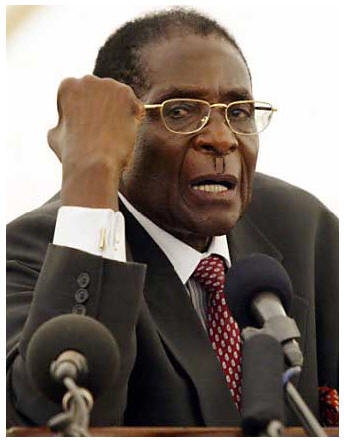

At least Mugabe is honest: “Some are crying that they were beaten. Yes you will be thoroughly beaten. When the police say move, you move. If you don’t move, you invite the police to use force,” he said about trade-union activists arrested in September last year.
Paralysed by hero-worship, the Southern African Development Community summit in August supported Mugabe’s claims of a UK plot, our Heads of State gave Mugabe a podium and a standing ovation in Kenya in May, most of them backed Zimbabwe’s cruelly ironic election to the UN Commission on Sustainable Development this year and the whole AU boycotted a 2003 summit with the EU because Mugabe was excluded.
Their pretext is the sacred mantra of non-interference and respecting sovereignty–meaning the sovereignty of ruling cliques, not of long-suffering citizens.
Our leaders have to recognise that Mugabe is not an ideological dictator in the mould of their heroes Kwame Nkrumah in Ghana, Julius Nyerere in Tanzania, Kenneth Kaunda in Zambia or Milton Obote in Uganda, nor even like ideologues such as Hitler, Stalin or his own hero Kim Il Sung: he is a straightforward kleptocrat determined to hold on to power at any cost.
He was applauded for complaining about commodity prices being fixed by the West, although free markets do not fix prices in the way that African governments fix prices and monopolise commodity sales.
SADC leaders in Lusaka even backed Mugabe’s claim that Zimbabwe is a victim of economic sanctions although the only measures, by the EU and the USA, are travel and financial restrictions on about 130 members of the ruling clique (in fact, the UK is the second biggest provider of humanitarian assistance to Zimbabwe). SADC executive secretary Dr. Tomaz Salomao said in November: “for us they are sanctions and our approach has been to have them lifted."
Many also shared Mugabe’s economically-ignorant call for self-sufficiency. But no developed country is self-sufficient in commodities (nor even most manufactured products) and we Africans cannot live on a diet of cocoa beans and tea: selling it is much more profitable.
Manufacturing and adding value are great economic aims but they do not happen successfully by government decree–right now, Africans suffer heavy import tariffs for essential inputs (such as fertilizer) and medicines, state control of exports, lack of property rights, obstacles to private enterprise and a ubiquitous corrupt bureaucracy.
Yet our leaders do not accept that the key to our future is allowing our people to create wealth: we cannot free ourselves from poverty without economic freedoms such as property rights, the rule of law and free markets.
But the Mugabe version remains attractive because we all like to believe that our failures are someone else’s fault.
And Mugabe remains in power after 27 years, at the age of 83. It seems true that evil men live long but that is because every day an evil man lives is like eternity to the oppressed.
Neither South Africa’s “quiet diplomacy” nor Western restrictions on money-laundering can influence a man who is cocooned in delusions and treated with deference by his neighbours.
Our new crop of elected African leaders, blithely talking of an African Renaissance, should be emboldened by their own democratic authority to face up to people like Mugabe (and the leaders of Ethiopia, Sudan and Somalia).
They should make Mugabe unwelcome at civilized meetings like the EU-AU summit in Lisbon and put legal pressure on him by consensus, as West African leaders did to force out Charles Taylor in Liberia.
Our leaders managed to evade any action at the recent Commonwealth Summit because Zimbabwe is no longer a member but the AU-EU summit puts Mugabe centre-stage: he has confirmed he will go and Britain’s Prime Minister Gordon Brown has confirmed his boycott.
They should listen to Ghanaian former UN Secretary-General Kofi Annan who said recently: "Africans must guard against a pernicious, self-destructive form of racism that unites citizens to rise up and expel tyrannical rulers who are white, but to excuse tyrannical rulers who are black"
Before embarrassing themselves again, our leaders must come to their senses and join the huge majority of Africans who reject the barbaric Mugabe: by embracing economic freedoms to save their own countries, they would offer hope to Zimbabweans for the day after Mugabe.
4 Dec 2007
Kofi Bentil is a lecturer at Ashesi University and a consultant in business strategy in Accra, Ghana
Published in critical opinion. Available at : http://www.criticalopinion.org/articles/127
